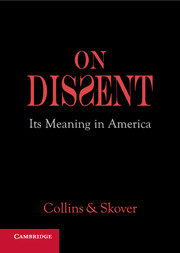Book contents
- Frontmatter
- Contents
- Informationis Personae
- Prologue
- Chapter I From Judicial Dissent to Peaceful Protest
- Chapter II From Civil to Uncivil Disobedience
- Chapter III The Vagaries of Violence
- Chapter IV Dissent, Inc.
- Chapter V Dissent and Law's Parameters
- Epilogue
- Notes
- Acknowledgments
- About the Authors
- About the Informationis Personae
- Select and Annotated Bibliography
- Index
Chapter V - Dissent and Law's Parameters
Published online by Cambridge University Press: 05 May 2013
- Frontmatter
- Contents
- Informationis Personae
- Prologue
- Chapter I From Judicial Dissent to Peaceful Protest
- Chapter II From Civil to Uncivil Disobedience
- Chapter III The Vagaries of Violence
- Chapter IV Dissent, Inc.
- Chapter V Dissent and Law's Parameters
- Epilogue
- Notes
- Acknowledgments
- About the Authors
- About the Informationis Personae
- Select and Annotated Bibliography
- Index
Summary
Without dissent the First Amendment would be meaningless. If the Constitution protected no more than speech with which we agreed, there would be nothing in need of protection. The unorthodox, the nonconformist, the outcast and their like give vital life to the First Amendment. Without protecting them, the First Amendment would be little more than a parchment admonition – a gospel to be preached on Sunday and flouted every other day.
Think of the work that the First Amendment does. It safeguards the speech of those who refute our creeds, reject our values, renounce our government, and even repudiate our very way of life. This uniquely American principle of free speech provides a haven for irritating ranters and irksome rogues who feel the need to spoil our parade. In short, it protects the voice of the other. And whose voice is that? It is the voice of the dissenter.
There is something romantic about the idea of dissent, which helps explain why we cherish it. Ideally, we as a people want to be open-minded; we want to be tolerant when it comes to any variety of opposing religious, political, or cultural views. We admire the daring man who stands up when others sit down; we admire those who have the courage of their convictions. The iconic value of dissent cannot be overemphasized. Offensive as it was to some at the time, who can forget that morning in October 1968 when two African Americans (gold medalist Tommie Smith and bronze medalist John Carlos) raised their fists in brazen protest when they stood on the podium to receive their Olympic medals? Or recall Mary Beth Tinker and the black armband she wore to her high school class to protest the Vietnam War. So great is the iconic significance of that act of dissent that her armband is today enshrined in a glass case at the Newseum in Washington, DC, for all to see and admire.
- Type
- Chapter
- Information
- On DissentIts Meaning in America, pp. 103 - 128Publisher: Cambridge University PressPrint publication year: 2013



